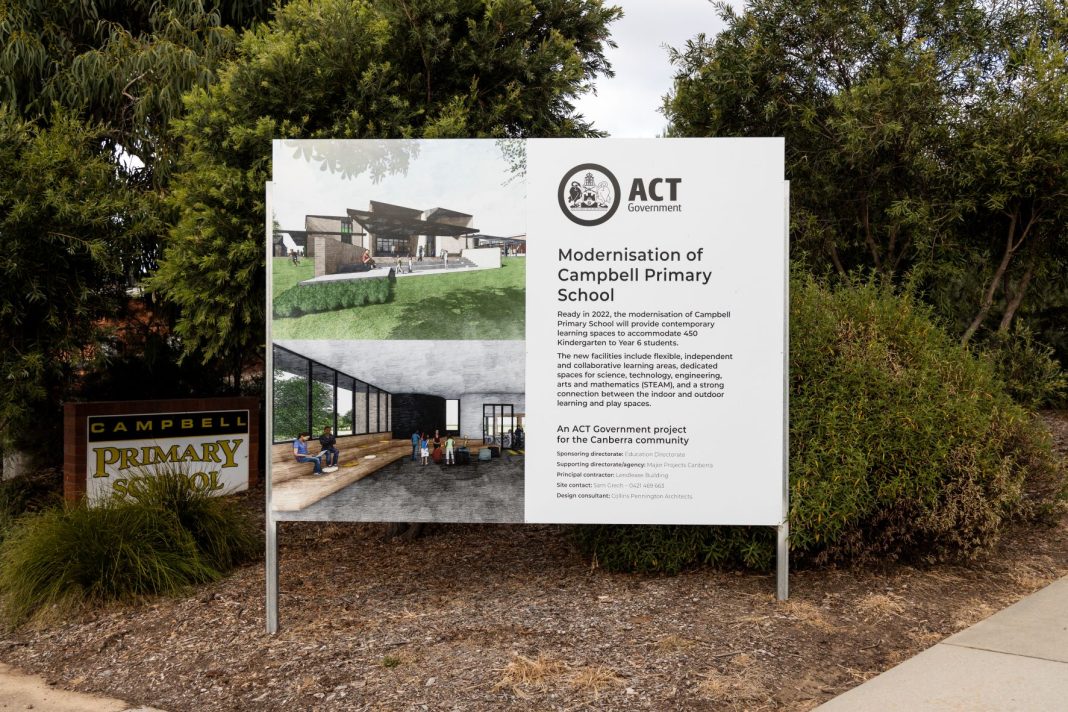The ACT Integrity Commission has called on building and construction tenderers to come forward with information about suspected improper conduct in ACT Government procurement processes, following the Auditor-General’s report in December that the procurement for the Campbell Primary School Modernisation Project lacked probity.
The Commission considers that the shortcomings the Auditor-General identified warrant further investigation into possibly corrupt conduct, and raise the possibility that other procurement processes may have been similarly affected.
The Integrity Commissioner, Michael Adams QC, urged design, building, and construction businesses to report their suspicions to the Commission.
“Businesses which have tendered for government contracts are encouraged to contact the Commission where they reasonably suspect corrupt conduct has occurred, or is occurring, in government procurement or in relation to any aspect of the ACT public sector’s operations with which they have been involved. We want to hear from you.”
Background
The ACT Government announced in 2018/19 that it would spend $18.8 million to modernise Campbell Primary School, built in 1961. Out of six firms that expressed interest, two were invited to submit tenders: Lendlease Building and Manteena Commercial. Lendlease was awarded the contract for services in September 2020, and construction work began in January 2021.
However, the Auditor-General’s report stated: “Tenderers were not dealt with fairly, impartially, and consistently.”
It found that two different tender evaluation teams identified Manteena as the preferred tender at two stages; Manteena received the highest scores against the weighted evaluation criteria, and quoted the lowest price for services.
According to the report, the Delegate for the procurement, the Acting Executive Group Manager, Business Services Division (Education Directorate), disagreed with the team’s recommendation, and recommended to the Director-General that Lendlease be identified as the preferred tenderer because it offered best value for money. Lendlease outscored Manteena on three of the six weighted evaluation criteria, as Manteena did Lendlease on the other three (including the design solution).
The Auditor-General found that the Delegate re-weighted and re-prioritised the evaluation criteria. “Decision-making was not based on the evaluation criteria with which the Territory approached the market and sought tenders. Probity was not demonstrated in the government process to ‘deal fairly, impartially, and consistently with suppliers’.”
Unfair pressure was placed on Manteena to acquire its design for a sum significantly less than its true value, the Integrity Commissioner stated.
The Auditor-General’s report also identified governance and administrative shortcomings, including “informal, uncontrolled, and poorly documented” communication with tenderers and other parties that undermined the probity of the procurement process.
The Auditor-General made six recommendations for Major Projects Canberra to improve procurement planning and tender evaluation, including requiring independent probity advice where the delegate or decision-maker sought to overrule the tender evaluation team’s recommendation.
Canberra Liberals: A ‘damning’ report
Opposition leader Elizabeth Lee said the “suspected improper conduct” was an extremely serious matter.
“This is an extraordinary announcement by the Integrity Commission, and this Labor-Greens government must provide a full response to the scathing assessment of its procurement processes,” Ms Lee said.
She said the Chief Minister and his government must respond to the Auditor-General’s “damning” report.
“It is essential that government treats all procurement processes impartially and are transparent when it comes to spending taxpayers’ money.”
ACT Government response
A spokesperson said the ACT Government was unable to comment at this stage on any potential improper conduct on ACT Government projects.
However, the government was committed to making any further necessary improvements to ensure public confidence in future procurement processes, the spokesperson said.
The government was committed to ensuring that all procurement activity was fair and open and undertaken in accordance with the provisions of the Government Procurement Act 2001, the Government Procurement Regulation 2007, and all relevant policy and guidance material, the spokesperson said.
The government and relevant directorates and agencies worked constructively with the Auditor-General and the ACT Audit Office throughout the performance audit, and would work with the Integrity Commission if an investigation were undertaken, the spokesperson said.
The government broadly welcomed the recommendations in the Performance Audit Report by the ACT Auditor-General, and was developing a formal response to those recommendations, the spokesperson said.
The government would monitor and enhance the Procurement Framework as appropriate ahead of that formal response, the spokesperson said.
Guidance and training on the Procurement Framework is available to all ACT Government employees, the spokesperson said. An enhanced program of training and support provided for procurement compliance includes:
• a suite of eLearning Modules, which includes a Probity in Procurement Module;
• face to face, customised training sessions;
• fact sheets and better practice guides;
• procurement training bootcamps, which includes Value for Money Training for all Senior Executives across the ACT Government; and
• a Procurement Capability Framework.
In January 2021, Procurement ACT published the Probity in Procurement Guide on their website. Updated guidance on risk management, value for money considerations, calculating whole of life costs, and conflicts of interests was released last month.
A Supplier Complaints Management Procedure has been established to consistently manage supplier complaints about the conduct of Territory procurement, the spokesperson said. The procedure is designed to provide an effective and efficient process for managing supplier complaints relating to the acquisition stage of procurement activities, and is consistent with the government’s Free Trade Obligations relating to judicial review.



